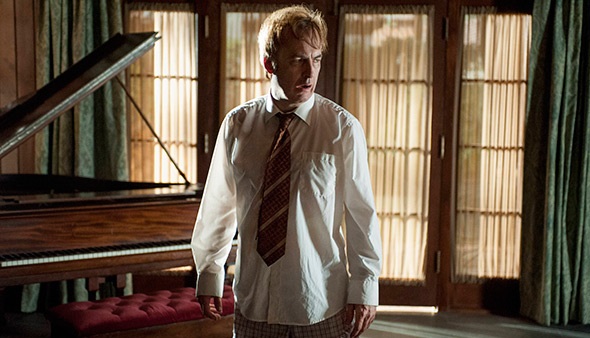
Better Call Saul, Season 1, Episode 2: “Mijo”
Written by Peter Gould
Directed by Michelle MacLaren
Airs Mondays at 10PM EST on AMC
After a solid opening hour, Better Call Saul continues to up the ante with an even more promising follow-up.
The beginning section, one of the episodes strong points, features a decidedly downplayed Tuco Salamanca (at least compared to the Scarface-like caricature that we’re used to from Breaking Bad). Strangely, the quieter, more subdued Tuco is actually far more menacing than the psycho drugged-up version. His intense close-ups and lean-ins add a brutal new dimension to this character, while his rage-fueled response to a trespass against his grandmother is strongly reminiscent of a certain key S3 scene from BB, in which Tuco’s uncle firmly intones that “family is all!”
While the next two scenes, once again, soar purely on the charm and charisma of Bob Odenkirk, it’s hard not to see shades of Breaking Bad here as well. Which is not to suggest that this is a weakness, on the contrary, it works in spades. Many of BB‘s best scenes revolved around a panicked Walter White, and his almost unfathomable talent for talking himself out of trouble. However, if there’s one character who could possibly out-talk Mr. White, than it would be Saul Goodman in a heartbeat (let’s not forget that Saul once talked himself from the tip of Walter’s own gun while kneeling over a grave in the middle of the desert).

Also like Walter, Saul has a survival mechanism that clashes with what’s left of his basic morality calculator. When he escapes Tuco’s wrath, he does take the time to try and save his small-minded goons, and even if each of the boys does walk (or stumble) away with a broken leg, it’s a hell of a lot better than some of the alternatives that Tuco had on the table. Saul himself puts it best: “I just talked you down to six months from a life sentence–I’m the best lawyer ever!”
A date scene in which Saul stares at the cleavage of his guest and flirts with her, while constantly being distracted by the breaking of bread sticks (Breaking Bread?) at a nearby table is a stroke of brilliance, and once again, strikes a nice balance between the dark subject matter and a pitch black comedy to match it.
Chuck, Saul/Jimmy’s brother, makes a return here, and it’s important to note that his manic condition is not played for much laughs this time around. Instead it’s treated with the honesty it deserves, and becomes simply a part of his characterization, given the situation. Much like how Saul balanced his greed with his loyalty in the premiere, Chuck ebbs between asinine concerns and sympathetic tones from moment to moment.

Something media representations often forget is that mental illness is not so funny for those who are dealing with it, and that even if it is amusing at times (from an outsider perspective) it can turn deadly serious in a heartbeat. Better Call Saul doesn’t make that mistake here. This is a wise decision, as it will allow the writers to get equal mileage from the storyline, employing both humor and sympathy from the audience in the future as the plot dictates.
A slick and effective montage follows this, with Saul coaching clients, bargaining with fellow lawyers, and generally just Saul-ing about. Michelle MacLaren, who directed this episode, gets special points here for how the scene is cut and synchronized for maximum effect. Obviously, she hasn’t lost her touch, as this episode shines with every frame, even more so than the premiere. Stale peanuts, vending machine coffee and an endless battle over parking stickers are the recurring set-pieces that sell this sequence, and they work like blue-collar charm at a black tie affair.
The episode ends with a consultation with the gangster who intervened in the earlier Tuco scene, proposing a different and far more lucrative manner of scam, which Saul shoots down…for now. Saul clearly says he’s not part of “the game”, but for how long will that remain true?

